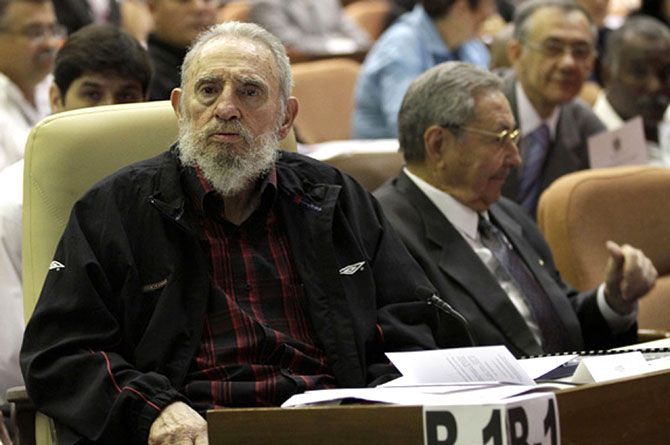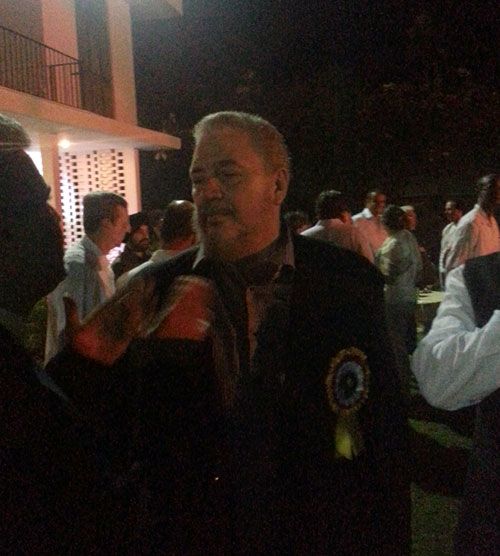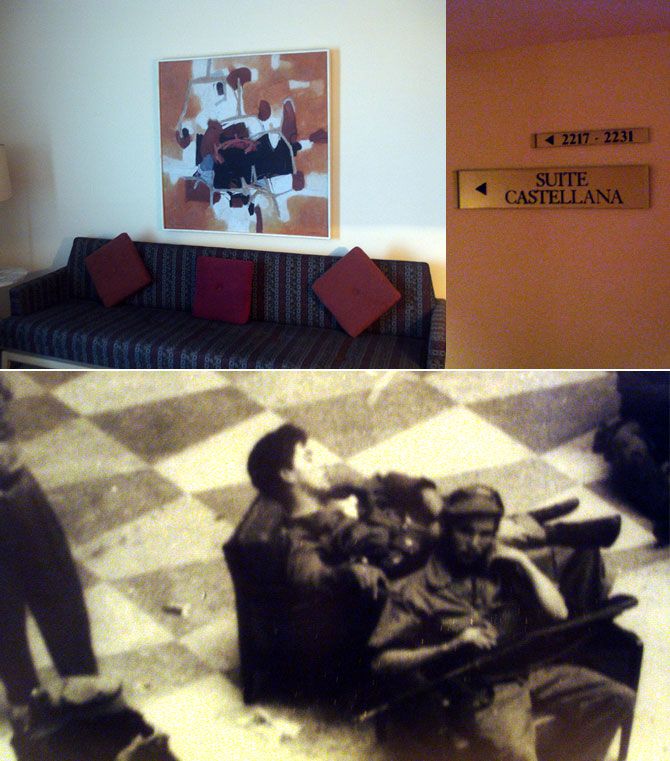Three years ago, Vice-President Hamid Ansari spent a couple of days in Havana, Cuba, and was granted a rare 65-minute audience with Fidel Castro, who passed into the Valhalla of revolutionaries on Friday, November 25.
Nikhil Lakshman, who travelled with the vice-president, spoke to Indian officials who accompanied Ansari to his meetings with Castro and current Cuban President Raul Castro for a rare glimpse of the brothers who ruled the island for 57 years.

Photograph: Ismael Francisco/Reuters
"My brother talks too much," Raul Castro quipped when an Indian delegation, led by Vice President Hamid Ansari, met him in Havana, October 30, 2013.
Earlier that day, Ansari had met Fidel Castro -- the vice-president had expected the meeting to go on for 20, 25 minutes. It went on for 65 minutes.
Fidel Castro, frail but still fierce in his world view, spoke about how to provide food for all, how to eliminate weapons of mass destruction, how to halt climate change... If Ansari had not gotten up, Castro -- who in his hey day spoke to his people for four and five hours at a stretch -- "would have continued speaking."
The awed Indian ambassador to Cuba, Chintapally Rajasekhar, who was present at Ansari's meeting along with the vice-president's charming wife Salma Ansari, later told reporters, "It was like witnessing God in Cuban form."
Fidel's younger brother, now the Cuban president, was in an equally expansive mood when he spoke to Ansari and the Indian delegation for 75 minutes -- ten minutes longer than his brother :) -- introducing his grandson who helped with the paperwork, announcing proudly that he was now a great-grandfather; said grandson being the father of a five year old.
As Ansari told the Indian media later, Raul Castro had already read the notes on the vice-president's morning meeting with Cuban First Vice President Miguel Diaz-Canal Bermudez, and was abreast of everything discussed between the two sides.
Even though he is 82, a member of the Indian delegation, who accompanied Ansari to the meeting, said Raul Castro looked fit, and seemed like a man in his early 60s, clearly in control of his destiny and the destiny of his country.
"There is perfect coordination between them," Ansari said, when Rediff.com asked what differences he had noted between Raul Castro and his elder brother. "Commandante (Fidel Castro) remains the undisputed leader of the revolution."
Raul Castro, who took over as Cuba's president after his elder (by five years) brother fell ill (with a yet unrevealed aliment) eight years ago, briefed the Indian delegation about some of the measures he has undertaken to free the Cuban economy from its Communist shackles -- in agriculture and tourism, for instance.
Some degree of privatisation has been permitted in agriculture so that it can become more productive and reduce Cuba's excessive dependence on agricultural imports.
Tourism -- mainly from Europe, 2.5 million tourists visited the tiny island in 2012; in comparison, just 6.5 million tourists visited India that year -- boosts the Cuban economy which has been in meltdown, first after its primary patron, the Soviet Union, broke up 22 years ago, and after its recent generous sponsor, Venuzuela's Hugo Chavez, died earlier this year.
A member of the Indian delegation speculated about the eventual effects tourism will have on the Cuban mindset. Suddenly, Cubans involved in the tourism trade are being exposed to sums of money in one day that they earlier earned in a year. The Indian official wondered how this would impact a people brought up to believe that they live in a Communist paradise where everyone is truly equal.
Possibly, the official felt, these Cubans would begin to comprehend that maybe all was not well in Shangri-La, and there were economic ways to better their lives.
Two things the Castro regime has ensured are education for all (98% of Cubans are educated) and top-class healthcare, absolutely free of charge. Dr Sanjay Nagral, a surgeon at Mumbai's Jaslok hospital who occasionally contributes to Rediff.com, noted in an e-mail, "Even their worst critics seem to admit that it is one of the most people oriented models in the world."
Public transport is also free; as are rations. The Libreta de Abastecimiento (the Supplies Booklet or ration card) cites what each citizen is entitled to every 15 days. Among the provisions guaranteed are apparently alcohol and tobacco. Cuban officials told the Indian delegation that they are trying to eliminate the subsidised booze and cigarettes (Cubans smoke prodigiously), but have encountered resistance in this regard.
Young Cubans we spoke to extol life in the country, emphasising that they are truly content with the lives they lead. One returnee to Havana told an Indian television reporter that he had traveled to Tehran for studies and lived in the Iranian capital for sometime, but hastened to return home. He knew others like him, he told the Indian reporter, who had lived in European cities, but came back to Havana at the first opportunity.

Photograph: Nikhil Lakshman/Rediff.com
True change may come to Cuba possibly after Fidel Castro passes into the ages. Even though he no longer has an official role in government or the Communist party which has ruled Cuba since the January 1, 1959 revolution -- hence, Vice-President Ansari's encounter with him was deemed a social engagement and not an official meeting -- Fidel dominates decision-making.
His absence from this world would perhaps embolden Raul Castro to be Cuba's P V Narasimha Rao and free the country and its people from its Rules Raj.
The younger Castro has already embarked on the political unthinkable -- after he was re-elected president in February 2013, he announced it would be his final term in office. When it ends in 2018 -- he will be his brother's current age then -- Raul Castro will hand over power to Miguel Diaz-Canal Bermudez, his designated successor, something he repeatedly mentioned to Vice-President Ansari.
Despite this emphasis, a member of the Indian delegation felt the transition was not assured. Everything may seem overtly orderly, this Indian official felt, but intrigue was already brewing in the backrooms. Other likely successors to the Castros probably already have Bermudez -- who this Indian official described as a modernist and a professional -- in their sights.
At this stage it is unlikely that power will flow later to one of Fidel Castro's many children or a member of Raul Castro's family.
Rediff.com ran into Dr Fidel Castro Diaz Balart, the Commandante's eldest son, at Indian Ambassador Rajasekhar's overflowing reception for Vice-President Ansari in Havana.
A dead ringer for his father, Dr Castro was speaking with Ali Chegini, the Iranian ambassador to Cuba and Rajasekhar's neighbour, when this correspondent rather rudely interrupted the conversation, saying, "I had hoped to meet your father when I came to Cuba, but I am glad to meet you Sir."
Speaking in American-accented English, external link, Dr Castro shook his head and said, "It is not the same thing," before turning to tell Ambassador Chegini that he had been to Tehran three times, ignoring the Indian reporters milling around him.
Also present at the reception -- where Cubans in colourful turbans served hors de oeuvres -- was Mariela Castro Espín, President Raul Castro's daughter and an outspoken activist for gay and lesbian rights. The large turnout of prominent Cubans at Rajasekhar's dinner was a tribute to the sentiment for India on the island -- on Havana's streets, Indian reporters were often greeted by "India! India!" and "Gandhi, Gandhi."
Despite the enduring relationship, Vice-President Ansari's journey was astonishingly the first visit by an Indian leader of that stature to Cuba. Previous visits by Prime Ministers Rajiv Gandhi and Manmohan Singh were what they describe in diplomatese as multilateral visits, to attend Non Aligned Movement summits.
Ansari believes his meeting with Fidel Castro -- the only such meeting with a leader outside the region in 2013 -- was a "gesture to India, the value he and the Cuban system places on the relationship with India."
An Indian official present at the vice-president's meeting with Raul Castro and Bermudez pointed out how both Cuban leaders repeatedly mentioned that India had voted against the US sanctions against Cuba at the United Nations two days earlier.
One hundred and eighty eight countries -- including the United Kingdom, the only occasion it votes against its trans-Atlantic partner -- voted against; only the US and Israel endorsed the American sanctions.

Photograph: Nikhil Lakshman/Rediff.com
Indian Ambassador Rajasekhar recalled how when Jawaharlal Nehru heard that Fidel Castro had been turned away from New York hotels in 1960 after he traveled there to attend the UN General Assembly and was forced to stay at the Theresa, a small hotel in Harlem, the Indian prime minister drove to the Theresa to meet Castro.
"There is a memorable picture of Panditji and the Commandante in conversation," Rajasekhar said, "Castro sitting on the edge of his bed, listening intently."
Like his daughter Indira Gandhi instructed Hamid Ansari, India's chief of protocol during the Non Aligned Movement summit in New Delhi 21 years later ("Whatever he wanted," Vice-President Ansari told this reporter, "she told us it was to be given to him"), Nehru told the Indian officials accompanying him that they were to extend every courtesy to Castro during his stay in New York.
Though Indira Gandhi did not visit Havana -- she met Castro on his visit to New Delhi in 1973 and then 10 years later when he enveloped her in that famous bear hug at the NAM summit -- her son Rajiv and grandson Rahul both visited Cuba. Rahul was in Havana on a private visit four or five years ago, but there is no record of his meeting Fidel Castro.
"There are no business or investment opportunities here," an Indian diplomat said later. "Cuba is a reclusive society. Why then are 121 nations's ambassadors based in Havana? Because Cuba is what India used to be, the voice of the developing world. Cuba is the Mecca for people of progressive thought. It is not desirable to have Cuba as an enemy."
"When there is a vote in the United Nations, India can always count on Cuba's support, and vice versa," the diplomat said, adding, "Just because there are no neon lights, it does not mean the relationship is not important. India is fortunate to have Cuba as a friend."
As the Indian delegation stood up to leave after the meeting with Raul Castro, Jitin Prasada, then the minister of state for HRD, pointed out to the fern-like plants in the Cuban president's office. Castro, his country's highest ranked general, smiled. "You can see them all over the countryside," said the man who was for 47 years defence minister and main supervisor of his country's vigil against a possible American invasion.
"Under those plants, my soldiers live," indicating that Cuba's defence structure is lodged in underground bunkers, away from the scrutiny of US satellites.
This feature was first published on Rediff.com on November 6, 2013.










 © 2025
© 2025